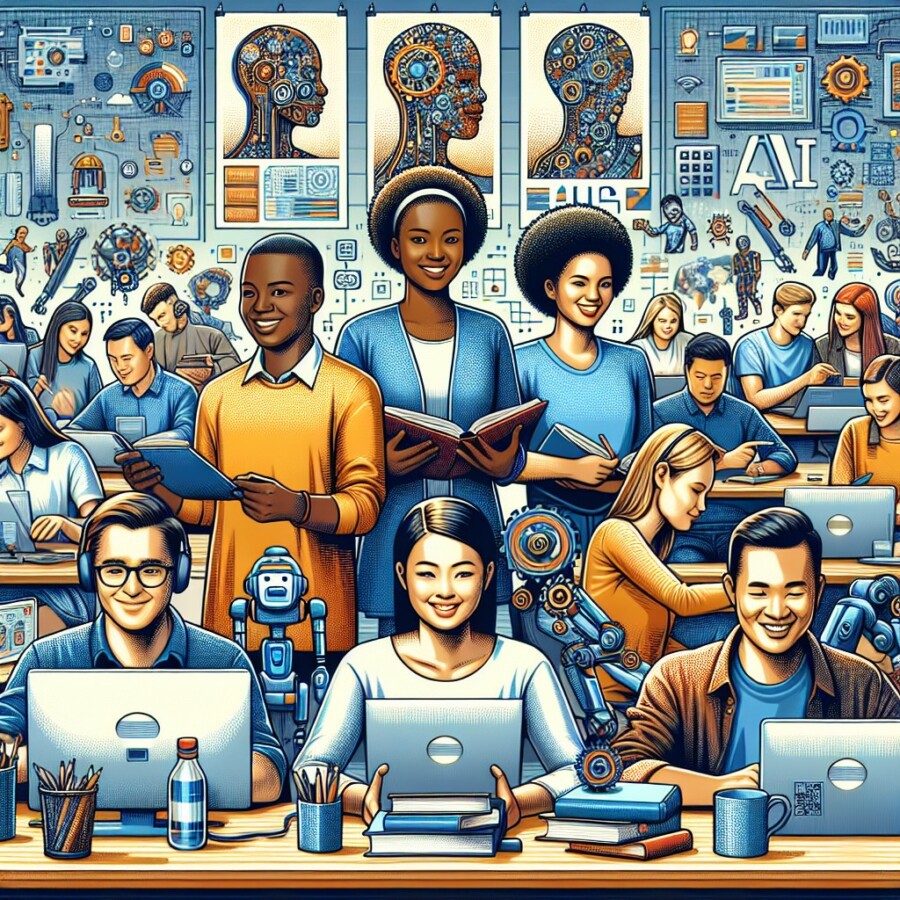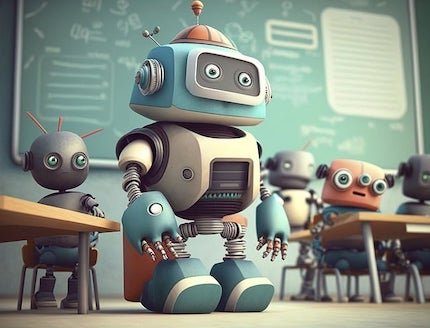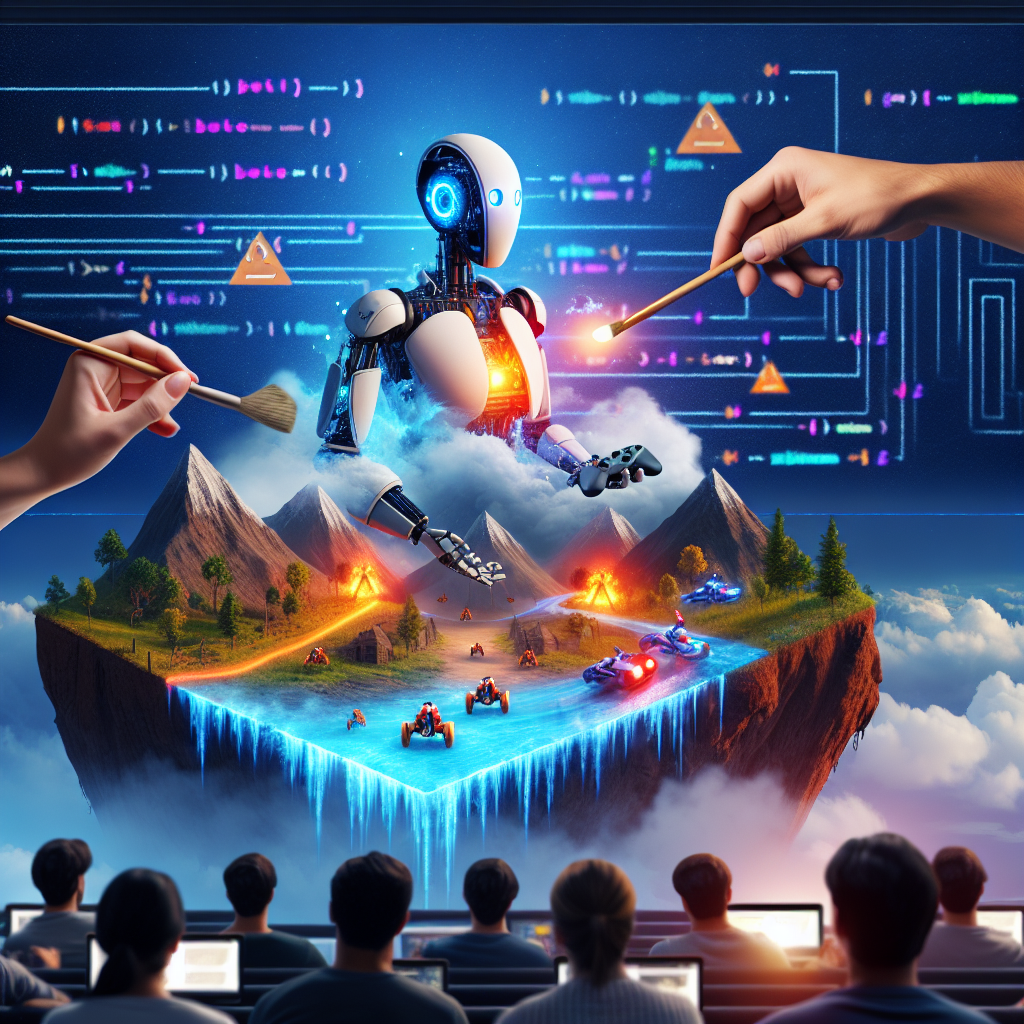A report says that robots and smart computers might change almost 40% of jobs. The boss of the IMF, Kristalina Georgieva, thinks that robots could make rich and poor people more different from each other. More jobs in rich countries might be changed by robots than in poor countries. Some people might lose their jobs or get less money because of robots.
The report says we need to help people who might lose their jobs because of robots. Some people who have more money or are younger might get more money from using robots. But people who don’t have much money or are older might have a harder time. Right now, important people are talking about robots at a big meeting in Switzerland and some countries are making new rules for robots.
In short, the report tells us that robots could change many jobs and make some people richer and others poorer. It says we should help people who might be hurt by these changes. And all around the world, people are starting to make rules about how to use robots safely and fairly.
Original news source: AI to hit 40% of jobs and worsen inequality, IMF says (BBC)
🎧 Listen:
Slow
Normal
Fast
📖 Vocabulary:
| 1 | report | A paper or story that gives information about something |
| 2 | smart | Having a good brain or able to learn and understand things quickly |
| 3 | change | To make something or someone different |
| 4 | boss | The person who is in charge at work |
| 5 | robots | Machines that can move and do tasks by themselves |
| 6 | different | Not the same |
| 7 | countries | Places with their own governments and borders |
| 8 | lose | To not have something anymore |
| 9 | meeting | When people come together to talk about things |
| 10 | Switzerland | A country in Europe known for mountains and chocolate |
| 11 | rules | Instructions that tell you what you are allowed to do |
| 12 | fairly | In a way that is right and honest |
Group or Classroom Activities
Warm-up Activities:
– News Summary
Instructions: Divide the class into pairs. Give each pair a copy of the article. Instruct them to read the article together and then summarize the main points in their own words. After a few minutes, have pairs share their summaries with the class.
– Opinion Poll
Instructions: Divide the class into small groups. Give each group a list of questions related to the article, such as “Do you think robots will make rich and poor people more different from each other?” or “Should governments provide financial assistance to people who lose their jobs due to robots?” Instruct the groups to discuss the questions and record their responses. After a few minutes, have each group share their opinions with the class.
– Vocabulary Pictionary
Instructions: Write a list of key vocabulary words from the article on the board, such as “robots,” “jobs,” “rich,” “poor,” “changes,” etc. Divide the class into two teams. One student from each team comes to the front of the class. Show the first student a vocabulary word and they have to draw a picture representing that word. Their team members must guess the word based on the drawing. The team with the most correct guesses wins.
– Keyword Hangman
Instructions: Write a sentence from the article on the board, but leave out some of the keywords. Divide the class into two teams. One student from each team comes to the front of the class. They take turns guessing letters to fill in the missing keywords. If a guessed letter is correct, it is filled in on the board. If it is incorrect, a body part is added to a hangman figure. The team that correctly guesses all the keywords or the team with the fewest hangman figure parts wins.
– Think-Pair-Share
Instructions: Have the class sit in a circle. Read a statement related to the article, such as “Robots will have a positive impact on the economy.” Instruct the students to take a moment to think about their opinion on the statement. Then, have them turn to a partner and discuss their thoughts. After a few minutes, ask some students to share their opinions with the class.
🤔 Comprehension Questions:
1. According to the report, what percentage of jobs might be changed by robots and smart computers?
2. How does the boss of the IMF think robots could make rich and poor people different from each other?
3. Are more jobs in rich countries or poor countries likely to be changed by robots?
4. Why might some people lose their jobs or get less money because of robots?
5. What does the report say we need to do to help people who might lose their jobs because of robots?
6. Who might get more money from using robots?
7. What are some countries doing in response to the report’s findings about robots?
Go to answers ⇩
🎧✍️ Listen and Fill in the Gaps:
A report (1)______ that robots and smart computers might change almost 40% of jobs. The boss of the IMF, Kristalina Georgieva, thinks that robots could make rich and (2)______ people more different from each (3)______. More jobs in rich countries might be changed by robots than in poor countries. Some people might lose their jobs or get (4)______ money because of robots.
The (5)______ says we need to help people who might lose their jobs because of robots. Some people who have (6)______ money or are younger might get more money from using (7)______. But people who don’t have (8)______ money or are older might have a harder time. Right now, important people are talking about robots at a big meeting in Switzerland and some countries are making new (9)______ for robots.
In short, the report tells us that robots could change many jobs and make some people (10)______ and (11)______ poorer. It says we should help people who might be (12)______ by these changes. And all around the world, people are starting to make rules about how to use robots safely and fairly.
Go to answers ⇩
💬 Discussion Questions:
Students can ask a partner these questions, or discuss them as a group.
1. What is a robot?
2. How would you feel if robots took over some jobs?
3. Do you think robots will make rich and poor people more different from each other? Why or why not?
4. Do you like the idea of robots changing jobs? Why or why not?
5. What do you think can be done to help people who might lose their jobs because of robots?
6. How do you think robots can make some people richer and others poorer?
7. Do you think it’s fair that some people might get more money from using robots? Why or why not?
8. How do you think older people might have a harder time with robots?
9. Do you think it’s important for countries to make new rules for robots? Why or why not?
10. How do you feel about the idea of robots changing many jobs?
11. What do you think about the suggestion to help people who might be hurt by these changes?
12. Do you think it’s necessary to use robots safely and fairly? Why or why not?
Individual Activities
📖💭 Vocabulary Meanings:
Match each word to its meaning.
Words:
1. report
2. smart
3. change
4. boss
5. robots
6. different
7. countries
8. lose
9. meeting
10. Switzerland
11. rules
12. fairly
Meanings:
(A) A country in Europe known for mountains and chocolate
(B) Instructions that tell you what you are allowed to do
(C) Not the same
(D) To not have something anymore
(E) In a way that is right and honest
(F) The person who is in charge at work
(G) A paper or story that gives information about something
(H) To make something or someone different
(I) Machines that can move and do tasks by themselves
(J) When people come together to talk about things
(K) Having a good brain or able to learn and understand things quickly
(L) Places with their own governments and borders
Go to answers ⇩
🔡 Multiple Choice Questions:
1. According to the report, how much of jobs might be changed by robots?
(a) Almost 20%
(b) Almost 60%
(c) Almost 80%
(d) Almost 40%
2. Who is the boss of the IMF?
(a) Angela Merkel
(b) Emmanuel Macron
(c) Kristalina Georgieva
(d) Boris Johnson
3. What does the boss of the IMF think robots could do to rich and poor people?
(a) Make them more similar to each other
(b) Make them more different from each other
(c) Make them the same
(d) Make them disappear
4. Which countries might have more jobs changed by robots, according to the report?
(a) Poor countries
(b) Rich countries
(c) Both rich and poor countries
(d) No countries
5. What might happen to some people because of robots?
(a) Lose their jobs or get less money
(b) Get more jobs and more money
(c) Stay the same
(d) Become robots themselves
6. Who might have a harder time if they don’t have much money or are older?
(a) People who might get more money from using robots
(b) People who are younger
(c) People who might lose their jobs because of robots
(d) People who are richer
7. Where are important people talking about robots at a big meeting?
(a) Switzerland
(b) France
(c) Japan
(d) Australia
8. What are some countries starting to make rules about?
(a) How to use robots dangerously and unfairly
(b) How to get rid of robots
(c) How to become robots themselves
(d) How to use robots safely and fairly
Go to answers ⇩
🕵️ True or False Questions:
1. On the other hand, people with less money or who are older might face more difficulties.
2. People with more money or who are younger might benefit more from using robots.
3. The report emphasizes the need to support people who may lose their jobs due to robots.
4. The boss of the IMF believes that robots could decrease the differences between rich and poor people.
5. A report suggests that robots and smart computers might affect less than 40% of jobs.
6. Poor countries may see more jobs being changed by robots compared to rich countries.
7. Some people might gain more jobs or earn more money because of robots.
8. Countries are starting to create new rules for the safe and fair use of robots.
Go to answers ⇩
📝 Write a Summary:
Write a summary of this news article in two sentences.
Check your writing now with the best free AI for English writing!
Writing Questions:
Answer the following questions. Write as much as you can for each answer.
Check your answers with our free English writing assistant!
1. What percentage of jobs might be changed by robots, according to the report?
2. How might robots make rich and poor people more different from each other, according to Kristalina Georgieva?
3. Who might have a harder time if they don’t have much money or are older?
4. What are some countries doing in response to the changes caused by robots?
5. Why is it important to make rules about how to use robots safely and fairly?
✅ Answers
🤔✅ Comprehension Question Answers:
1. According to the report, about 40% of jobs might be changed by robots and smart computers.
2. The boss of the IMF thinks that robots could make rich and poor people more different from each other because some people might get more money from using robots while others might not.
3. More jobs in rich countries are likely to be changed by robots than in poor countries.
4. Some people might lose their jobs or get less money because robots can do their work faster and more efficiently.
5. The report says we need to help people who might lose their jobs because of robots by providing them with training and support to find new jobs.
6. People who have more money or are younger might get more money from using robots.
7. Some countries are making new rules for robots to ensure they are used safely and fairly.
Go back to questions ⇧
🎧✍️✅ Listen and Fill in the Gaps Answers:
(1) says
(2) poor
(3) other
(4) less
(5) report
(6) more
(7) robots
(8) much
(9) rules
(10) richer
(11) others
(12) hurt
Go back to questions ⇧
📖💭✅ Vocabulary Meanings Answers:
1. report
Answer: (G) A paper or story that gives information about something
2. smart
Answer: (K) Having a good brain or able to learn and understand things quickly
3. change
Answer: (H) To make something or someone different
4. boss
Answer: (F) The person who is in charge at work
5. robots
Answer: (I) Machines that can move and do tasks by themselves
6. different
Answer: (C) Not the same
7. countries
Answer: (L) Places with their own governments and borders
8. lose
Answer: (D) To not have something anymore
9. meeting
Answer: (J) When people come together to talk about things
10. Switzerland
Answer: (A) A country in Europe known for mountains and chocolate
11. rules
Answer: (B) Instructions that tell you what you are allowed to do
12. fairly
Answer: (E) In a way that is right and honest
Go back to questions ⇧
🔡✅ Multiple Choice Answers:
1. According to the report, how much of jobs might be changed by robots?
Answer: (d) Almost 40%
2. Who is the boss of the IMF?
Answer: (c) Kristalina Georgieva
3. What does the boss of the IMF think robots could do to rich and poor people?
Answer: (b) Make them more different from each other
4. Which countries might have more jobs changed by robots, according to the report?
Answer: (b) Rich countries
5. What might happen to some people because of robots?
Answer: (a) Lose their jobs or get less money
6. Who might have a harder time if they don’t have much money or are older?
Answer: (c) People who might lose their jobs because of robots
7. Where are important people talking about robots at a big meeting?
Answer: (a) Switzerland
8. What are some countries starting to make rules about?
Answer: (d) How to use robots safely and fairly
Go back to questions ⇧
🕵️✅ True or False Answers:
1. On the other hand, people with less money or who are older might face more difficulties. (Answer: True)
2. People with more money or who are younger might benefit more from using robots. (Answer: True)
3. The report emphasizes the need to support people who may lose their jobs due to robots. (Answer: True)
4. The boss of the IMF believes that robots could decrease the differences between rich and poor people. (Answer: False)
5. A report suggests that robots and smart computers might affect less than 40% of jobs. (Answer: False)
6. Poor countries may see more jobs being changed by robots compared to rich countries. (Answer: False)
7. Some people might gain more jobs or earn more money because of robots. (Answer: False)
8. Countries are starting to create new rules for the safe and fair use of robots. (Answer: True)
Go back to questions ⇧















